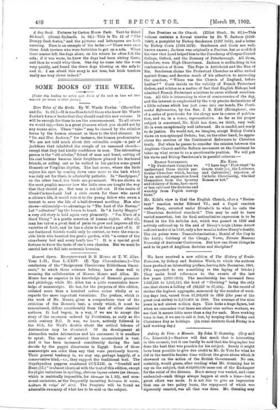Homeri Opera. Recognoverunt D. B. Monro et T. W. Allen.
Tomi I.-II., Ilias I. -XXIV. (E Typ. Clarendoniano.)—The conductors of the " Scriptorum Classicorum Bibliotheca Oxoni- ensis," to which these volumes belong, have done well in securing the collaboration of Messrs. Monro and Allen. Mr. Moore has no superior in his knowledge of Homeric grammar and philology, while Mr. Allen has a quite remarkable know- ledge of manuscripts. He has, for the purposes of this edition, collated more than a hundred codices either wholly or as regards the more important variations. The preface, which is the work of Mr. Monro, gives a compendious view of the criticism of the Homeric text, a study which, it must be remembered, differs considerably from that of other classical authors. It had begun, in a way, if we are to accept the story of the recension ordered by Pisistratus, as early as the sixth century B.C. It was, we know, actively followed in the fifth, for Wolf's doubts about the critical labours of Antimachns may be dismissed. Of its development at Alexandria under Aristarchus and his successors it is needless to speak. The mass of material thus accumulated is vast. And it has been increased considerably during the last decade by the papyri discoveries in Egypt. Some of these manuscripts are older than any that were previously known. Their general tendency is, we may say, perhaps happily, of a conservative kind,—i.e., they support the traditional text. The Oxyrhynchus papyrus numbered CCXXIII. in '‘ Grenfell and Hunt (II.) " is almost identical with the text of this edition, except for slight variations in spelling, obvious tapsus calami (as ideoper, which is metrically impossible, for 4ciecuper in 1. 32), and occa- sional omissions, as the frequently recurring ao6wsrer bi wood?, luntRntre veGxe Jr' aieri. The Praefatio will be found an
admirable summary of what has to be said on the subject.






































 Previous page
Previous page